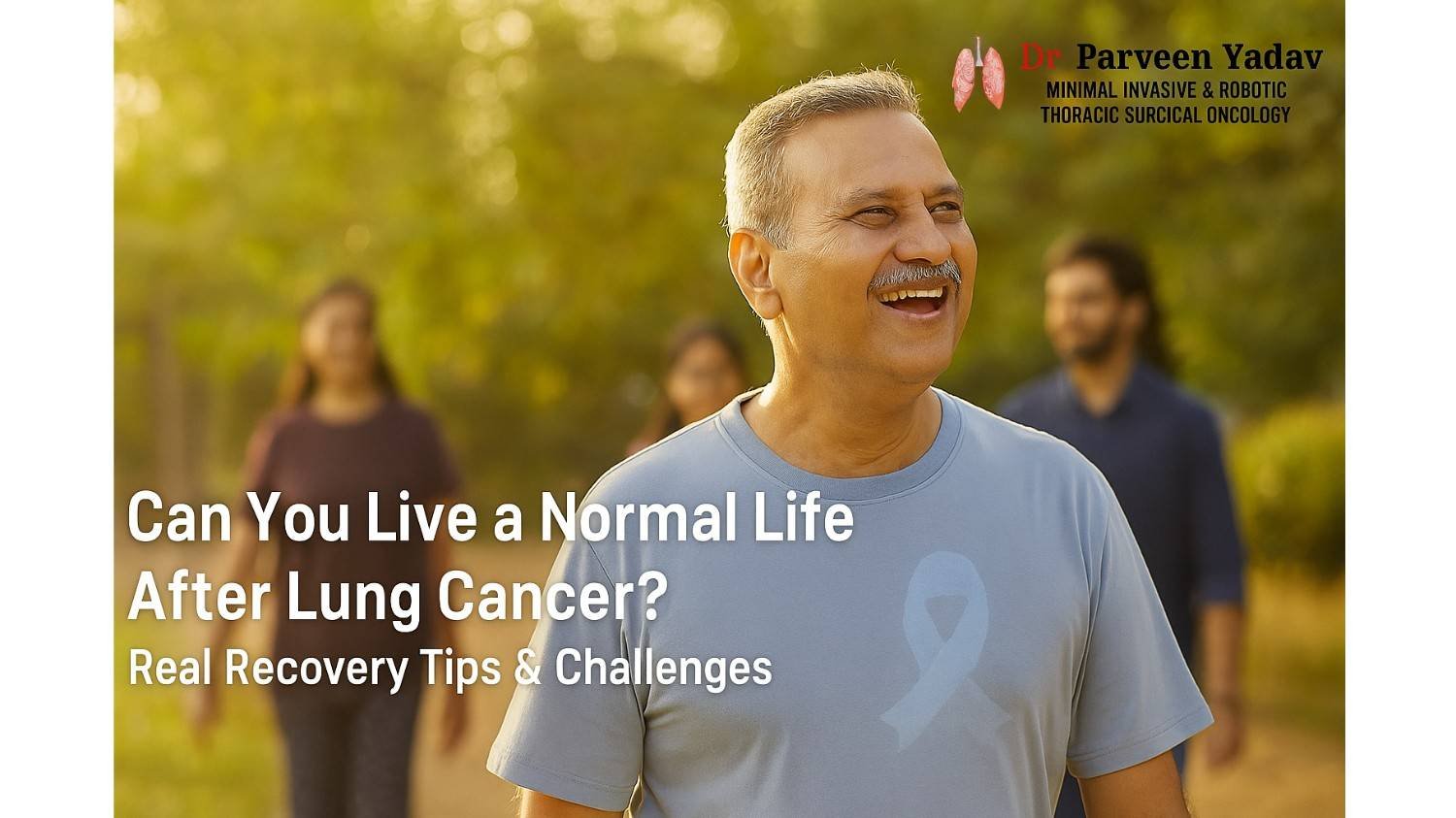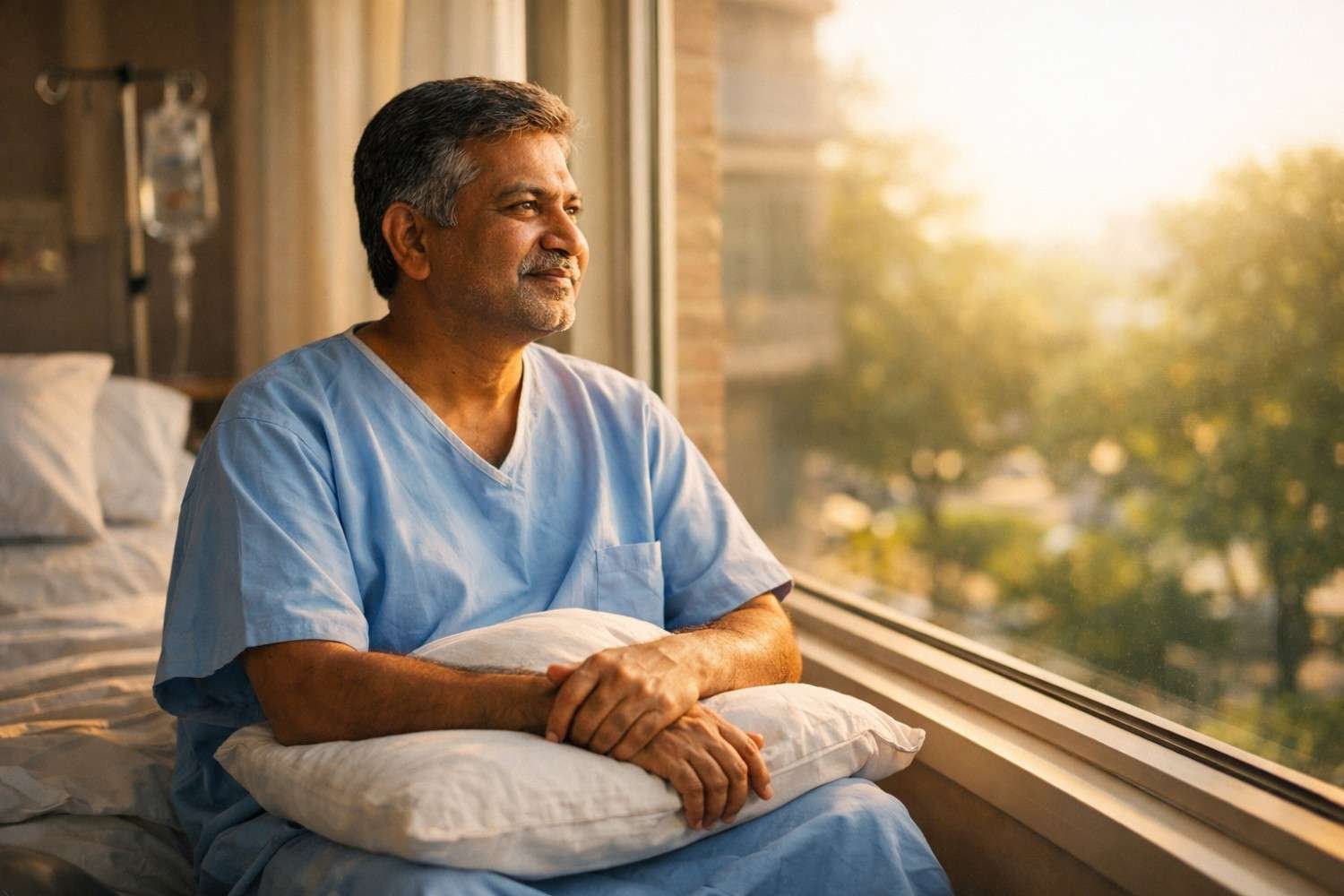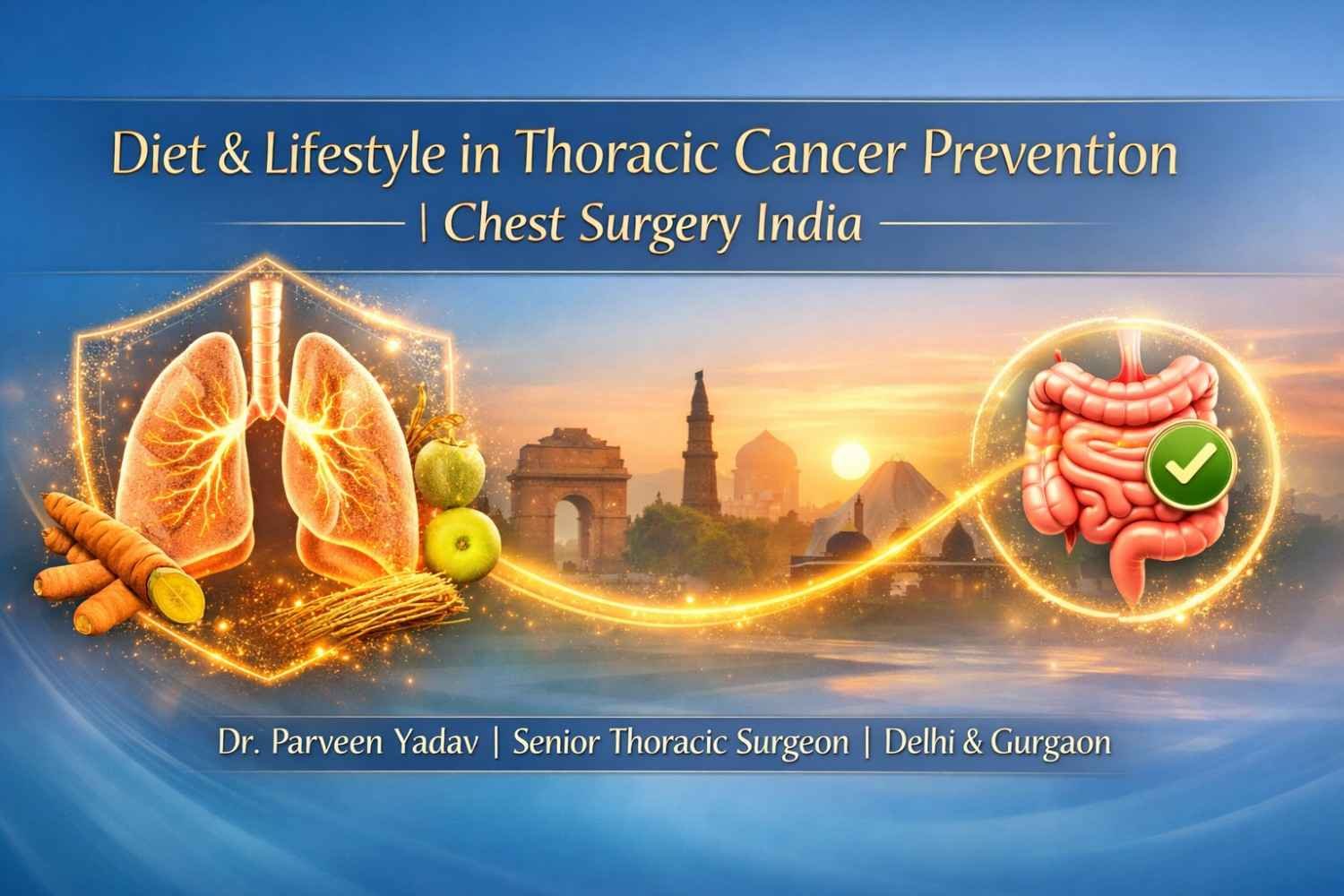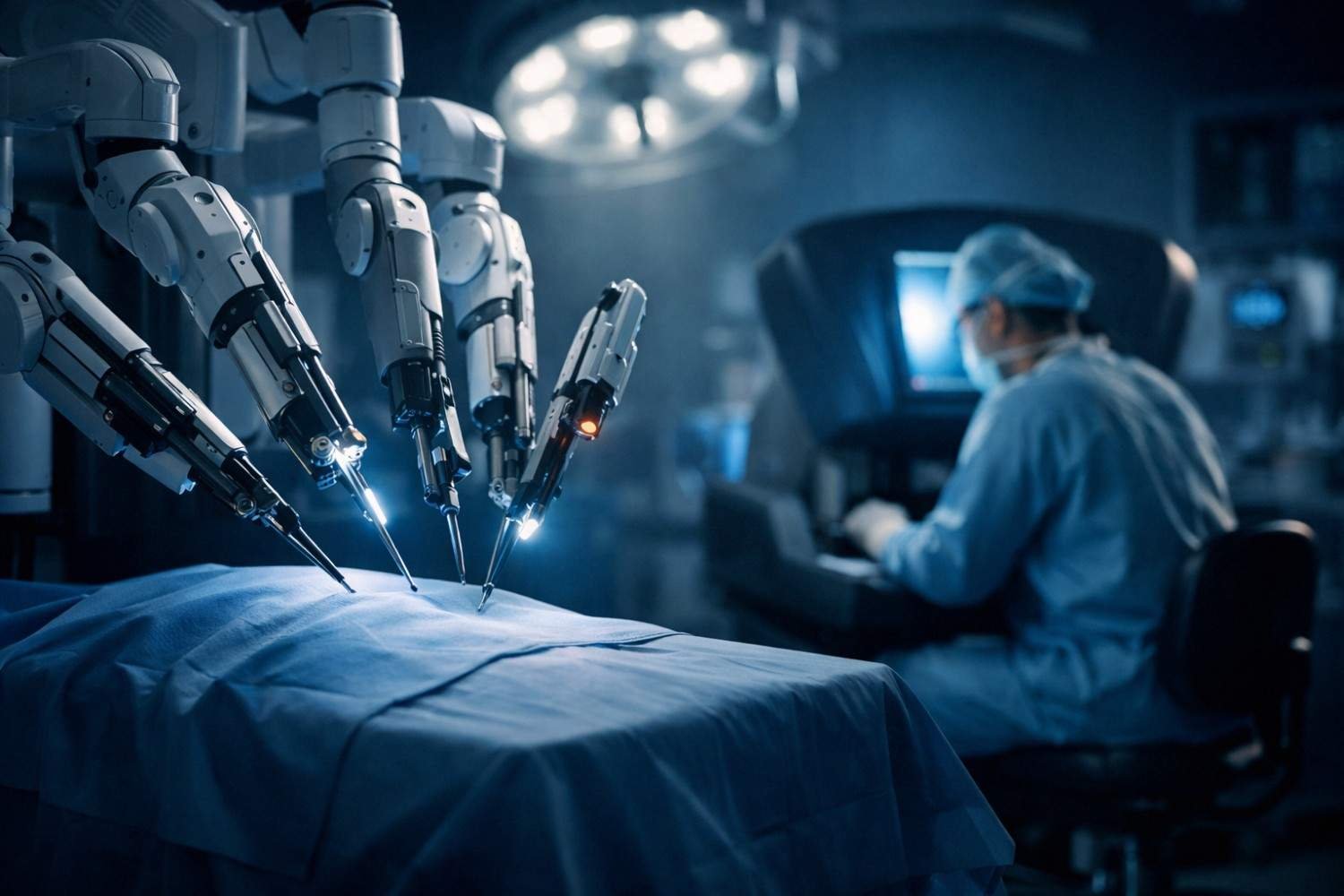

After hearing the words "You have lung cancer", one big question always comes to mind — Can I ever live a normal life again? It's a question full of fear, hope, and uncertainty. Whether you've just finished your treatment or are supporting someone through recovery, this doubt is very common.
But here's the good news — yes, many people do live happy, active, and fulfilling lives after lung cancer. Life might change a little, but it can still be full of purpose, joy, and new beginnings. Recovery is not just about the body but also about the mind and emotions. With the right support, guidance, and care, patients can rebuild their lives step by step.
At Chest Surgery India, under the expert care of Dr. Parveen Yadav, we walk this recovery path together with our patients. From surgery to long-term healing, we understand the physical, mental, and lifestyle changes that come after treatment — and we're here to support every stage.
In this blog, we'll talk about:
Let's start this journey of hope and healing.
After lung cancer treatment, the word "normal" may feel a bit confusing. What is normal now? Can life ever feel the same again?
The truth is, your new "normal" may not be exactly like before — but that's not a bad thing. Many survivors say they find a new purpose, stronger relationships, and better health awareness after their journey.
Physically, your body needs time to heal. Whether you had surgery, chemotherapy, or radiation, your energy levels may be low in the beginning. Some people feel breathless or tired often. But with time, exercise, and proper care, strength returns slowly. Healing is different for each person — so don't rush.
Emotionally, you might feel anxious or scared — especially about the cancer coming back. Some days may feel heavy. These feelings are completely normal. Talking to a counselor, joining a support group, or even speaking openly with family can help ease the mind.
You may notice changes in your social life. Some friends might not understand what you're going through. But you may also find deeper bonds with people who truly care. Rebuilding connections — or finding new ones — is part of the recovery.
Returning to work or a daily routine might take time. Some people choose a slower pace, part-time job, or even explore a new career that fits their health. What's important is to listen to your body and mind.
In short, life after lung cancer may look different — but different can still be good. It can be meaningful, peaceful, and full of hope. You just need to find your version of "normal".
After completing treatment, many lung cancer survivors ask, "What can I do to feel better and live fully again?" Here are some real, easy-to-follow tips to support your recovery journey — for your body, mind, and daily life.
Physical activity helps your lungs, muscles, and mood. Start with small things — short walks, light stretching, or breathing exercises. Slowly, your strength will improve. You can also take help from a physiotherapist to guide you safely.
Your body needs good fuel to heal. Eat fresh fruits, vegetables, and proteins like dal, paneer, or eggs, and drink plenty of water. Avoid oily and junk food. If you're struggling with appetite, speak to a dietitian — they'll give you a meal plan that suits your condition.
If you used to smoke, it's now more important than ever to quit fully. Smoking after lung cancer increases the risk of recurrence. Take support from your doctor or join a quit-smoking program.
Your doctor will schedule check-ups and scans after treatment. Please don't miss them. These visits help catch any issues early and track your healing progress.
You may still feel tired, have shortness of breath, or mild pain. Talk to your doctor about what you're feeling — there are simple treatments or therapies that can help. Even home remedies, like warm baths or guided breathing, may offer relief.
Cancer affects not only the body but also the mind. Don't ignore stress, sadness, or fear. A counselor, psychologist, or even a good doctor can guide you through it.
Meditation, yoga, deep breathing, or even hobbies like gardening or painting can calm the mind. Make time daily for things that give you peace.
Talking to other survivors can make you feel less alone. You'll learn from their experience and feel supported. Ask your hospital if they run any support meetings.
Healing is a slow process. Don't expect everything to be perfect immediately. It's okay to take breaks and rest when needed.
If you loved singing, drawing, reading, or gardening — start again slowly. These small joys give energy and emotional strength.
You can go back to your job when your body feels ready. Some choose part-time work or freelancing. Others find new paths like mentoring, consulting, or even volunteering.
Spending time with family, friends, or neighbors can lift your mood. Don't stay isolated — even a simple phone call or tea with someone close can make a difference.
Yes, you can travel! Just plan properly — take your medicines, avoid very polluted places, and don't overexert. Ask your doctor if you're fit for long-distance or air travel.
A survivorship care plan is a personal health plan created after your treatment ends. It guides you on follow-ups, lifestyle tips, warning signs, and support resources.
It helps you stay organized, avoid future risks, and remain in touch with your medical team. Many hospitals help make one — ask your doctor.
Even after treatment is over, many lung cancer survivors face physical, emotional, and practical challenges. This is normal — but the good news is there are ways to handle them. Let's look at some of the most common issues and simple tips to manage them.
Feeling tired all the time is one of the most common complaints after cancer treatment. It can feel different from regular tiredness — more like exhaustion even after resting.
What Helps:
After lung surgery or radiation, some people feel breathless. This can be scary but is often manageable.
What Helps:
Pain in the chest, back, or shoulder area can continue after surgery or treatment.
What Helps:
Some people experience nausea, loss of taste, or numbness in fingers or feet (peripheral neuropathy) after treatment.
What Helps:
It's natural to worry — "What if the cancer comes back?" This fear is called Fear of Recurrence (FOR).
What Helps:
Mood swings, sadness, or worry can happen often. If these feelings stay for many weeks, it may be depression.
What Helps:
Surgery or treatment can change how you look or feel about your body. Scars, weight loss, or breathlessness may affect self-esteem.
What Helps:
Cancer treatment can be expensive. Even after treatment, follow-ups and medicines cost money.
What Helps:
Sometimes, patients feel lost — too many appointments, tests, or doctors.
What Helps:
Doing regular things like cooking, walking to the shop, or bathing can feel tiring at first.
What Helps:
Recovering from lung cancer is not just about one doctor or one treatment. It takes a whole team working together to support your mind, body, and daily life. This is called comprehensive care — and it can truly change the recovery experience.
While surgery or treatment may remove the cancer, recovery goes far beyond that. You may need help with breathing, eating better, dealing with stress, or building back your energy. That's why your care should include:
No two patients are the same. Some may bounce back quickly, while others may need more time. That's why a custom recovery plan — made just for you — is important. It includes you:
At Chest Surgery India, we believe every survivor deserves this personalized attention. Dr. Parveen Yadav and our team focus on not just removing cancer but helping you live well — truly well — after it.
Even after treatment ends, we don't say goodbye. Follow-ups, rehabilitation, mental health support, and survivorship planning — all are part of your journey with us. We stay connected so that you never feel alone.
Life after lung cancer is not always easy — but it is absolutely possible. With the right mindset, support, and care, many people go on to live active, happy, and meaningful lives.
You might walk a bit slower at first, or take more breaks in your day. But every step forward is a sign of your strength. The scars, both physical and emotional, are reminders of how much you've overcome. You are not just a patient — you are a survivor.
Recovery is a journey, not a race. And it's okay to ask for help along the way.
If you or a loved one are recovering from lung cancer and have questions about how to move forward, you are not alone. At Chest Surgery India, under the expert care of Dr. Parveen Yadav, we specialize in complete lung cancer care — from treatment to total recovery.
Let's build your new normal together — full of strength, purpose, and good health.
1. Can you live a normal life after lung cancer?
Yes, many people live a fulfilling and active life after lung cancer with proper care, support, and healthy lifestyle changes.
2. How long does it take to recover from lung cancer?
Recovery time varies, but most people start feeling better within a few months after treatment, depending on their health and treatment type.
3. Is lung cancer likely to come back after treatment?
There is a chance of recurrence, but regular follow-ups and a healthy lifestyle can aid in early detection and prevention.
4. What are common side effects after lung cancer treatment?
Fatigue, breathlessness, pain, and mood changes are common and can be managed with medical help and lifestyle adjustments.
5. Can lung cancer survivors exercise?
Yes, light exercises like walking and breathing techniques are helpful for recovery and lung strength under a doctor's guidance.
6. What food should lung cancer survivors eat?
A balanced diet with fruits, vegetables, protein, and plenty of water helps boost immunity and overall healing.
7. Can I go back to work after lung cancer treatment?
Yes, many survivors return to work—some full-time, others part-time—based on their energy levels and recovery pace.
8. How do I deal with the fear of lung cancer coming back?
Talking to a counselor, joining a support group, and focusing on healthy habits can ease anxiety about recurrence.
9. Are support groups helpful after lung cancer?
Absolutely! Sharing experiences with other survivors can bring emotional strength, guidance, and hope.
10. When should I see my doctor after lung cancer treatment?
Follow-up visits are usually every 3 to 6 months at first. Your doctor will give you a clear schedule to stay on track.

18+ Yrs Exp | 5,700+ Thoracic & Robotic Cancer Surgeries
Dr. Parveen Yadav is a Director and Senior Consultant in Thoracic and Surgical Oncology, specializing in minimally invasive and robotic lung and esophageal surgeries, with advanced training from AIIMS and Tata Memorial Hospital.
View Full Profile Pain After Thoracic Surgery: Tips for Smooth Recovery
Pain After Thoracic Surgery: Tips for Smooth Recovery
 Diet & Lifestyle for Thoracic Cancer Prevention | Dr. Parveen Yadav
Diet & Lifestyle for Thoracic Cancer Prevention | Dr. Parveen Yadav
 Robotic Thoracic Surgery: How Da Vinci Technology is Revolutionizing Chest Procedures
Robotic Thoracic Surgery: How Da Vinci Technology is Revolutionizing Chest Procedures
Struggling with pain after chest surgery? Dr. Parveen Yadav shares expert recovery tips, causes of shoulder pain, PTPS signs, and what your discharge sheet won't tell you.
Discover how diet, breathing exercises & daily habits help prevent and recover from thoracic cancer. Expert insights from Dr. Parveen Yadav, Chest Surgery India
Discover how Da Vinci robotic surgery is transforming chest procedures in Gurgaon. Less pain, faster recovery & expert care by a certified thoracic surgeon
Copyright 2026 © Dr .Parveen Yadav all rights reserved.
Proudly Scaled by Public Media Solution!